Kathleen Jones's Blog, page 56
April 8, 2013
Tuesday Poem: Death of a Bee
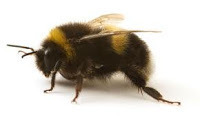 Death of a Bee
Death of a BeeOn the sill,
stumbling towards light
with legs crutched under
and one wing askew.
I place a teaspoon
of supermarket honey.
Open the window.
In the morning,
a crumpled tuft of brown
and gold - one irridescent flake
tilted as if for flight.
My garden trees are bare.
No blossom; the sun
still in its winter quarter.
All elegy. I tip the tiny
carcass out onto the grass
a meal for microbes.
In the room, something delicate
has shifted.
© Kathleen Jones
We're having a very late spring here in the north of England - usually daffodils and crocuses would be flowering outside and my magnolia stellata is always in flower at the beginning of March. This year there's nothing in the garden but a few clumps of snowdrops shivering in a Siberian wind. Finding dying bees is always distressing - these aren't domestic honey bees, but wild bees, whose plight hasn't had much publicity. They are dying catastrophically in droves and apparently their role in the pollination of crops and wild plants has been very under-estimated . This is a world-wide problem and even remote and protected eco-systems, like New Zealand, are being affected. Climate change is obviously a factor, but chemical interventions in agriculture are also believed to be significant. I live in an area where pesticides and herbicides are used freely by farmers - their role in the devastation of the wild environment simply can't be ignored.
I know it's been over-quoted, but I can't help thinking of the prophetic speech attributed to Chief Seattle in 1854, about the environmental consequences of western 'civilisation' and its lack of respect for the natural world.
'Where is the thicket? Gone.
Where is the eagle? Gone.
The end of living and the beginning of survival..... All things are connected.'
See Article in Science News.
How Darwin's Humble Bee became the Bumble Bee
The Tuesday Poem is 3 years old this month and to celebrate, participants are constructing a group poem based on rhythmic variations - a kind of jazz poetry! Take a look over at the Tuesday Poem hub.
Published on April 08, 2013 03:00
April 5, 2013
Book Launch: Dreams of the Blue Poppy, by Angela Locke
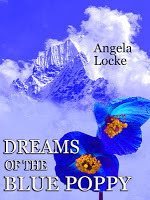 It's a week of book launches - my first e-single on Wednesday, and now Angela Locke's historical romance 'Dreams of the Blue Poppy'. This novel is the second fiction publication by
The Book Mill
- our own small venture into independent publishing - and our first by
Angela Locke,
who has had a distinguished career in traditional publishing, journalism and children's television. Dreams of the Blue Poppy was initially published by Robert Hale, but shamefully allowed to go out of print. It's a lovely, historical romance, with a botanical twist, set in the Lake District and the Himalayas (you couldn't have a better setting!) and beautifully written. I asked Angela to tell me about the history of the novel.
It's a week of book launches - my first e-single on Wednesday, and now Angela Locke's historical romance 'Dreams of the Blue Poppy'. This novel is the second fiction publication by
The Book Mill
- our own small venture into independent publishing - and our first by
Angela Locke,
who has had a distinguished career in traditional publishing, journalism and children's television. Dreams of the Blue Poppy was initially published by Robert Hale, but shamefully allowed to go out of print. It's a lovely, historical romance, with a botanical twist, set in the Lake District and the Himalayas (you couldn't have a better setting!) and beautifully written. I asked Angela to tell me about the history of the novel.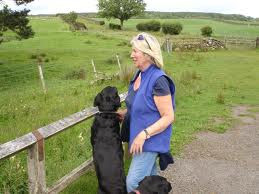 Angela with her two dogs in Cumbria
Angela with her two dogs in Cumbria1. Angela, when and where did you get the idea for this novel?
If it hadn't been for my sister buying a Victorian garden and building a house there, looking over the Pennine Valley, I would probably never have written 'Dreams of the Blue Poppy'. It was there that my sister showed me meconopsis grandis, the Tibetan Blue Poppy, growing against a sandstone wall. I had never seen a flower so beautiful and such an amazing blue, and despite never having really taken an interest in gardening before, I set out on a quest to find out about this incredible flower. I was already very interested in Tibet, and when I began researching the book, I felt I had to go to the Himalayas to see where the Blue Poppy grew naturally on the mountainsides.
2. I know that this was the start of a life-changing journey for you - what happened?
When I was due to go to the Himalayas for the first time to start research, I was doing a big shop for the kids and my husband before I left, when I met a Tibetan monk in Safeways – he was wearing a black tracksuit, not robes - and was over in Britain teaching at Conishead Priory in Cumbria. We started talking about Tibet, and I told him I was going to the Himalayas the following week to research my book. He came up to me at the checkout again and said, 'The book is not important, but the journey is important!' I hadn't the first idea what he meant. But now I realise that I had to make that journey before I could ever finish the book. On the journey, I trekked in remote parts of Nepal, worked with the Tibetans-in-exile and met the Dalai Lama in a Scottish monastery.
3 How did you develop the story?
I started with the idea of the search for something non-material, spiritual even – and the Tibetan Blue Poppy came to symbolise that search. The book is about letting go of material possessions – in this case a mansion in Cumbria which Charles inherits, but where he's been very unhappy – in order to pursue what seems to be an impossible dream. There is a natural link between Cumbria and the high Himalaya, as we have so many mountaineers living here. Also Cumbria was one of the first places to employ plant hunters to develop their great gardens, as the soil and climate are very similar.
I wanted to turn the idea of inheritance and riches, which in many books is the goal and happy ending of the story, on its head, as it were – so the hero starts off inheriting wealth and privilege, and ends up with nothing, having nonetheless fulfilled his dream and found happiness.
I spent 15 years on the research, including four visits in the Himalayas, endless visits to Kew and to the great gardens of the North, and a whole library of books on plant hunters, Tibetan Buddhism, geography and botany of the Himalayas. I became fascinated by the lives of the plant hunters and the obstacles they overcame in order to find that delicate and ephemeral thing – a new flower. I grew several different meconopsis in my garden and was always astonished by their beauty.
4 What else did this research lead to?
I went 4 times to Nepal and fell in love with the people and the Himalayas. As a result, I founded Juniper Trust www.junipertrust.co.uk which helps support sustainable communities, especially villages in the mountains, and particularly helps with education and health of children. Juniper Trust has now built 4 schools in the poorest parts of Kathmandu, and also works all over the world with the most disadvantaged communities. It was such an unexpected journey, beginning with the sight of that wonderful blue flower in the hills of Cumbria, and it changed my life.
5. I know you went to great lengths to get the botany right. Would you like to talk about it?
I was about to lead a writing course on the island of Iona, and crossing Mull, when I decided to take a detoured to Tarasay Gardens. As I walked into the tea room, I saw a bowl of blue poppies on a table, with a notice saying that this was a new Blue Poppy grown there for the first time, and they would like suggestions for names. I was excited by the coincidence, and went in search of the Head Gardener. Mike Swift told me that it was he who had developed the meconopsis at Langholm Gardens in Cumbria, when he was head gardener there. It is now sadly closed. We started talking about blue poppies, and I told him about writing the book, and how I had been inspired by seeing my sister’s flowers, and also from growing meconopsis sheldonii, another Blue Poppy, in my own garden. It turned out he had actually developed that Blue Poppy himself while he was at Langholm. I'd often visited there to look at the blue poppies growing in the Woodlands, and to experience the Himalayan vegetation which is so wonderfully recreated there. Mike turned out to be a real expert on meconopsis, and later became a crucial adviser during the writing of the book. I even found him while he was on the ferry to Oban, where he was going to do his washing, just before the book went to press, to double check an important technical point.
6 How easy was it to get the novel published initially and how many disappointments did you suffer on the way?
When I first started to pitch the book to publishers, no one was really writing about gardens – it just wasn't a sexy subject – and no one really knew about the plant hunters. It's very different now! However, Little Brown did decide to publish, and the Editor was very committed to the book. Then, on the day when we were waiting for the contracts to be faxed through, we had four pages with Sorry! written on every page. Apparently the sales team had vetoed the book because the Americans would not understand the dialect. Later, for Robert Hale, John Hale, the grandson of the founder, was very helpful – recommending some cuts which were actually very useful, and asked me to remove most of the dialect. It taught me a lesson about how to keep the inflection and lilt of language, with a few keywords, and not make it incomprehensible to a wider audience. If I had done that to start with, Little Brown would probably have gone ahead with publishing! There was a rather nice coda to that story in that the Editor at Little Brown, under her own name, wrote a very kind review on Amazon for me about the book – I only wish she had put CEO Little Brown underneath, but perhaps that's ungrateful!
7 Did you feel your first publishers were totally committed to your book and how much effort did they put into promotion?
Robert Hale were fantastic, especially the Marketing team. They paid for a big launch up in Cumbria with very good posters, flyers and bookmarks, and also a launch on the island of Iona. They gave me a great deal of support, really behind the book. Unfortunately, they don't have a paperback house, and though there was talk of foreign rights, they came to nothing. I also think that the cover artwork let it down – I should have vetoed it at the time. It was a mistake to try to market the book is yet another country house novel, with a hand-painted cover, when I had tried to subvert the form and bring in other elements. However, in fairness it did sell reasonably well, and I had some good royalties initially.
8 Now that you've dipped your toe in the water, what do you think of E-publishing so far?
If it's Kath, Neil and The Book Mill I would do it again any day! The Book Mill have been fantastic. I am absolutely delighted with the cover, and the artwork that Neil has created, and the service you have both given to me. I think that if that had been the original cover, it would have sold like hot cakes!
9. Thanks for the reference Angela! What are you working on at the moment?
I have just finished writing my new book Days of the Tamarisk, set in France from 1943 to 1947, about the work of the French Resistance and the reparations after World War II. Dreams of the Blue Poppy took me 15 years to write, but this one has actually taken 33! I began the research in the Imperial War Museum when my children were toddlers, handling classified material which I had been given clearance to inspect – and it's gone through many incarnations since then. I've also been doing the final edits and polishing on a new Mr Mullett book for children – Mrs Mullett and the Cloak of Gaia, which I hope will be properly finished in the next few weeks.
Thanks for your time Angela and for allowing us to publish your book, which we hope will be a big success. You can read my review over at my bookblog. Dreams of the Blue Poppy is available on Kindle, Kobo Reading Life and on Smashwords. For more information about Angela and her other publications please take a look at www.AngelaLocke.co.uk Now to break out the virtual bubbly!

Published on April 05, 2013 15:30
April 4, 2013
Do Authors Dream of Electric Books?: Death of a Kindle - Kathleen Jones
Do Authors Dream of Electric Books?: Death of a Kindle - Kathleen Jones: I was recently in Cambodia - which proved more of an endurance test than I'd expected. What with being ill, my email and Facebook acco...
Published on April 04, 2013 20:26
April 3, 2013
'I think . . . I am going to die...' the new E-single from New Zealand
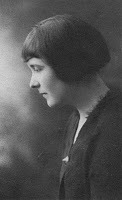 'I think . . . I am going to die . . .'by Kathleen Jones Just released today - among the first group of 'E-singles' being published by
Bridget Williams Books
- a new independent publishing enterprise in Wellington, New Zealand. I was absolutely delighted to get the email from BWB this morning to say that my contribution is now officially 'live'. It's a stand-alone piece on the final day of Katherine Mansfield's life at Fontainebleau and the reactions of her husband, John Middleton Murry and her friend Ida Baker, and hopefully it's a good introduction that might tempt people to buy
the full biography!
'I think . . . I am going to die . . .'by Kathleen Jones Just released today - among the first group of 'E-singles' being published by
Bridget Williams Books
- a new independent publishing enterprise in Wellington, New Zealand. I was absolutely delighted to get the email from BWB this morning to say that my contribution is now officially 'live'. It's a stand-alone piece on the final day of Katherine Mansfield's life at Fontainebleau and the reactions of her husband, John Middleton Murry and her friend Ida Baker, and hopefully it's a good introduction that might tempt people to buy
the full biography!
Described in their blurb as:
'A moving, beautiful description of Katherine Mansfield's last days'
This stunning chapter from Kathleen Jones's biography Katherine Mansfield: The Story-teller (2010) describes Mansfield's last days and death at chateau near Paris, the centre of a spiritual movement led by the mysterious Russian philosopher-mystic Georges Gurdjieff.
View the media release (PDF) for 'I think ... I am going to die.'.
Published on April 03, 2013 01:24
March 31, 2013
Eavesdropping on Someone's Life - Norman Nicholson
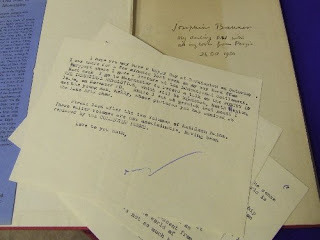 NN's papers offered at auctionWriting this on the train back from Manchester, across the frozen, snow-bound Pennines. I’ve been in the John Rylands Library all week, locked in the Special Collections unit, with the Norman Nicholson archive.
NN's papers offered at auctionWriting this on the train back from Manchester, across the frozen, snow-bound Pennines. I’ve been in the John Rylands Library all week, locked in the Special Collections unit, with the Norman Nicholson archive.It’s a thrilling, but strange experience, reading the letters of the long-dead - people you didn’t know.
Rather voyeuristic. The past is a time-capsule you can wander about in, finding tantalising snippets of a life - bus tickets, postcards, receipts, newspaper cuttings, letters and appointment diaries. And you wonder just how true your impressions of people are, taken from the random, everyday trivia they preserved, and what they chose to reveal of themselves to others. We’re all selective when it comes to what we want to disclose, depending on who the other person is and the impression we want to make.
At the moment, in his late teens and early twenties, Norman is coming across as rather callow and just a touch arrogant. But maybe it’s all a pose, from a young man who lost all his chances of university life and a glittering academic career, by contracting TB and being shut up on his own in a sanatorium for 2 years. He has a lot to prove and he doesn’t want people to think him an uneducated, working-class write-off. It will be interesting to watch him develop. Because that’s one of the plus-factors of biography - you get to watch your subject grow up.
I had a long chat with Dr David Cooper over lunch - he’s the unchallenged expert on Norman Nicholson’s poetry. There’s very little critical material on Nicholson, so it’s good to be able to discuss it with someone who’s spent years studying it. David Cooper has deliberately avoided the biographical aspect to focus on the text, so his opinion is going to be interesting.
Now it’s back to the Mill to write it all up.
Published on March 31, 2013 03:53
March 25, 2013
Tuesday Poem: Hanging Washing with Meredith
Hanging Washing with MeredithChristchurch, 14th February, 2013
In the garden, fenced by fields of barley,
full sun and a dry, Canterbury wind,
the spindle drier spins and pings
like ship’s rigging; coloured pegs
on white towels, a child’s T-shirt;
mother and daughter, without speaking
lift and clip, lift and clip, to one
rhythm, an echo of each other
the big, white sheets blowing
and lifting from our separate hands.
© Kathleen Jones
I don't often write about my children, but this poem was an attempt to describe the feeling of closeness captured in a quiet, ordinary domestic moment. Two women hanging out washing on a line - as generations of women have done. I live thousands of miles from my daughter so we're rarely physically together, and it just felt great!
There are lots more great poems on the Tuesday Poem hub - to check them out please click here.
In the garden, fenced by fields of barley,
full sun and a dry, Canterbury wind,
the spindle drier spins and pings
like ship’s rigging; coloured pegs
on white towels, a child’s T-shirt;
mother and daughter, without speaking
lift and clip, lift and clip, to one
rhythm, an echo of each other
the big, white sheets blowing
and lifting from our separate hands.
© Kathleen Jones
I don't often write about my children, but this poem was an attempt to describe the feeling of closeness captured in a quiet, ordinary domestic moment. Two women hanging out washing on a line - as generations of women have done. I live thousands of miles from my daughter so we're rarely physically together, and it just felt great!
There are lots more great poems on the Tuesday Poem hub - to check them out please click here.
Published on March 25, 2013 16:30
March 22, 2013
Rachel Abbott reveals some secrets about her new best-seller
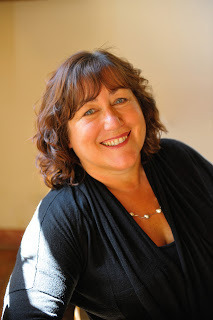
I've just been reading Rachel Abbott's new thriller The Back Road , and I'm very impressed by it. I'm also curious to know what's behind an Indie best-seller. Rachel works very hard and is very professional and I'm anxious to learn as much as possible.
1. Rachel, I know that - like me - you spend quite a lot of your working life in Italy. Do you find it disruptive going to and fro? How do you find the atmosphere of Italy affects your ability to work? What are the drawbacks, from a research point of view, of being in one place and writing about another?
When we found our home in Italy we were really fortunate because from the day we saw it – a total ruin without a roof, and in some places not even walls – we felt that there was a special atmosphere about the place. It was peaceful, because it’s in the middle of the country, but there was a real feeling of serenity about it. I‘m probably being a fanciful writer, but that’s how it seemed to us. When I arrive there, I instantlyrelax, and however hard I’m working, it feels stress free.
We have a home in Alderney in the Channel Islands too, and I’ve been spending most of my time there, so there hasn’t been too much disruptive travelling for me – just for my husband - and as part of my next book will be based here on the island, that’s a real advantage.
I didn’t really have an issue writing Only the Innocent, because the locations were all places I know – London, Oxford – where I lived for a while – and several Italian locations. So that was fine. With The Back Road the location is a Cheshire village – and I have lived in a village too (although not in Cheshire).
I do think that to evoke the atmosphere of a place you have to have experienced it, and I’m really looking forward to writing the Channel Islands sections of my next book, because without a doubt you could not write about Alderney without ever experiencing it. Another totally unique place.
2. I find the atmosphere of place very strong in your novels. I know those villages - I've met those people. How do you get that atmosphere?
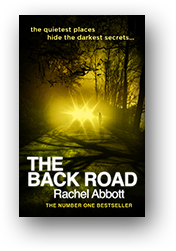
I am a bit fanatical about planning when I write. By the time I put pen to paper, figuratively speaking, I know exactly how every place looks. Take Ellie’s house in The Back Road, for example. I can actually see every detail of it in my head. I grab images of the internet and I paste them into my locations file. I have images of Ellie’s kitchen, atrium dining room, the outside of the house.
So when I write, I’m writing about places that I know as well as my own home. Even for the dinner party in The Back Road, I have a seating plan. I need to know who has to lean across somebody else to speak to another person.
When I write about a village, I work out where the shops are, and get photos of villages if I don’t already have a visual image. With regard to the people, obviously the main characters are very fully worked out before I start to write, but some of them do evolve. Leo, in The Back Road ended up taking a much more prominent position than she originally had, because I just love her.
When it comes to the villagers, though, these are people that I’ve really met. I don’t mean that each of them is modelled on a specific person, but there are characteristics that I have picked up and used. I observe people all the time (probably quite spookily) and love it when I see an interesting quirk that I can add to a character.
3. Do you ever envisage writing something set in Italy?
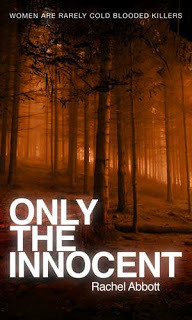 There were a few bits in
Only the Innocent
that took place in Italy – Venice, Positano and Le Marche – but one or two people have suggested I should do a complete novel based there. If Tom Douglas is still involved, as he definitely is in my next book, I would have to think of some reason for him going there, but I don’t think that would be very difficult.
There were a few bits in
Only the Innocent
that took place in Italy – Venice, Positano and Le Marche – but one or two people have suggested I should do a complete novel based there. If Tom Douglas is still involved, as he definitely is in my next book, I would have to think of some reason for him going there, but I don’t think that would be very difficult.It would be hard to resist making it a comedy, though. When we bought our first house in Italy thirteen years ago, we chose an area where there were practically no other English people, and it was one hundred per cent Italian in attitude and behaviour. We found so many things to make us smile - in a very affectionate way. On our first day there we took the project manager who was organising the restoration of our property into the nearby town (a beautiful medieval walled village, actually), and he showed us where to park the car – right underneath a tow sign. I pointed to it and he just shrugged and said, “It’s lunchtime. The police will be eating then sleeping. It’s okay” and that really set the tone.
I started to jot all these little quirks and amusing moments in a notebook with the thought of writing them into a novel - but I think I am more naturally inclined towards murder!
4. Where did the idea for The Back Road come from?
Have you ever been to a dinner party and got the feeling that there were things going on that you didn’t quite understand? Perhaps you saw a look pass between two people that you couldn’t exactly read? I wanted to write about ordinary people – some of whom have secrets. They may not necessarily be huge, life changing acts of deception, but if discovered they would have an impact on lives.
I wondered what would happen if some explosive catalyst was thrown into the mix, so that all the deceit is uncovered in a way that nobody can prevent or control.
5. I love the way you get food into the story (it's what I love about the Montalbano novels) - is this something you personally care about?
I love food. I enjoy cooking, and The Back Road did start off with even more cooking in, until my editor said it was a bit over the top! I wrote a scene in which Leo is in the supermarket with Ellie and they are buying some raw prawns, which Leo sees as grey slimy looking things until Ellie says she’s going to marinate them in lemon and garlic, barbecue them and then throw them into a salad with some avocado, feta cheese and a herb dressing. That got cut, unfortunately.
I think that for people who love food, it gives a much better feeling for the occasion. We could have had the dinner party in The Back Road without any mention of what everybody ate, but as a reader that wouldn’t have been the same for me at all. I’ve put quite a few of the recipes on my website too – and they’re all tried and tested – most of them were actually made up by me in the first place.
6. As someone who is both traditionally published and self-published, I'm interested in your views on having a foot in both camps. After the success of Only the Innocent - which I'm sure is going to be repeated with The Back Road - how do you feel about self-publishing now?
I think both forms of publishing have their advantages and disadvantages. With self-publishing there is a real sense of control, which is great. I can check my sales figures every two minutes if I want to (which I don’t, by the way) and I can choose the cover, control the blurb, and so on.
The bad thing about self-publishing is that many people actually can’t afford to have a professional editor. I couldn’t when I wrote Only the Innocent, and it was a success without that. But as soon as I had an agent after the success, she found me an editor and we did a thorough job of updating the book – and dramatically improving it. With a traditional deal, that would have happened before publication.
I feel that for The Back Road I have the best of both worlds. It has been professionally edited, which once again made a difference, but I chose to self-publish mainly because of the timing. I didn’t want to have to wait another six months to publish in the UK. The marketing side scared me a little, though, because I know that after Only the Innocent was launched, I did nothing but marketing for three months. I don’t want to do that again – I want to write books!
One of the most significant advantages of a traditional publisher is their ability to do the marketing of the book – although I know that it isn’t always the case. With the Thomas and Mercer deal in the US, they do all the marketing, and it’s a huge weight of my shoulders – leaving me free to write.
6. Just how much do you think your own awareness of media systems and your cyber-knowledge contribute to your success? Do you have any advice on using social media for new authors?
To be honest, I didn’t have any social media following at all when I launched Only the Innocent. I had set up a Twitter account, and had a stunning ninefollowers, and a Facebook page that I never used.
However, I do have a background in web development and in my previous job marketing was really important. This experience helped me to think more strategically about how to approach the whole social media arena.
My one piece of advice would be to write a marketing plan – create your own strategy. I bang on about this all the time on my blog, but it is so very easy to just plug away at something that isn’t helping at all, and writing a strategy helps you to think things through properly and justify how you spend your time. For example, you may have a Twitter strategy that says you want to increase your following to 10,000. The questions I would ask are “Why?” and “Who?” because you need to understand why you think having a lot of followers is going to help you, and you need to decide who they are going to be.
There are sites that offer lots of followers – but as a writer, you need followers who read books – and specifically yourkind of book. So you have to work out how to get those, and then how you’re going to engage them.
I’m learning all the time – and changing and tweaking my plan. But every marketing action that I take has a clear purpose, as defined in my plan.
7. Finally - who are your favourite thriller writers?
I love Harlan Coben (not the Myron Bollitar books – although they’re quite good fun). What I like about his stand alone books is that they are usually told from the point of view of the victim, rather than the police, and the story lines are very unique.
I also loved the early Minette Walters and Mary Higgins Clark books. I love books where I can empathise with the protagonist, and if they’re well written, I can feel what they are feeling – even if that’s fear.
I have also been a big Val McDermid fan over the years and I thought Gillian Flynn’s Gone Girl was well written and absorbing, although I didn’t actually like the characters. But, I will certainly read more of her books.
Thanks for your time Rachel - I loved the book and hope it's a great success!
You can read my review here.
Rachel blogs at http://rachelabbottwriter.wordpress.com
And you can look at her website here.
Published on March 22, 2013 16:30
March 21, 2013
Too Tired to Blog! Curling up with a book.
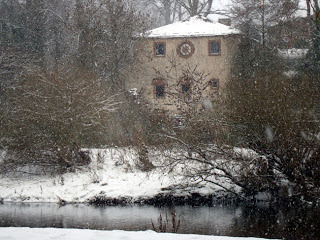 It can be bleak here in winter. After the frenetic travelling, trains, hotels and social events of the last week it was a bit depressing to arrive at a cold, empty house in the dark on a damp, cold evening, with snow on the ground. Three months mail had accumulated on the dining table (thanks to a kind friend who sweeps it up every week) and there was milk in the fridge from the same kind friend. But it was all a bit of an anti-climax and it felt very lonely. I whacked the central heating boiler up to maximum and went to bed with TWO hot water bottles!
It can be bleak here in winter. After the frenetic travelling, trains, hotels and social events of the last week it was a bit depressing to arrive at a cold, empty house in the dark on a damp, cold evening, with snow on the ground. Three months mail had accumulated on the dining table (thanks to a kind friend who sweeps it up every week) and there was milk in the fridge from the same kind friend. But it was all a bit of an anti-climax and it felt very lonely. I whacked the central heating boiler up to maximum and went to bed with TWO hot water bottles!I’ve spent the last couple of days catching up with the post and sorting out the house. It’s very odd coming into a place you haven’t been in for such a long time - it seems to belong to a stranger and you notice things differently. I found myself looking round the accumulated junk of a life-time and thinking ‘Do I really need all this?’ So a bit of de-cluttering is on the to-do list. I'd intended to do some gardening, but that's out of the question. The ground is either water-logged or frozen solid depending on the time of day and it's too cold to do any pruning or planting. Spring still hasn't arrived here.
This isn't normal weather for mid-March. There’s more snow on the way apparently - lots of it - and Siberian winds, so I’d better get the thermal gear out of the cupboard and onto the radiators in preparation. There’s hot chocolate on the shelf in the kitchen and plenty of new reading matter to curl up with - Sarah Salway’s new poetry collection ‘You do not need another self-help book’ - just in time for World Poetry Day - was waiting in the pile of mail on the table, plus a book of short stories by contemporary Irish writer Nuala Ni Chonchuir, called ‘ To the World of Men, Welcome’, as well as ‘In Their Own Words’ a book of poets on poetry edited by Helen Ivory and George Szirtes. Good stuff on the Kindle too - Rachel Abbott’s new thriller The Back Road (read on the train), Kathleen Jamie’s fabulous collection of essays ‘Sightlines’ and ‘Orkney’ - the new novel by Amy Sackville that I’ve been waiting two years for. British winter weather is perfect for reading!
Published on March 21, 2013 14:10
March 14, 2013
Katherine Mansfield at the Oxford Literature Festival
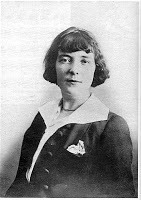 I'm just dashing around and packing up to catch a plane tomorrow morning back to the UK - and I do sometimes wish my life would allow me to be in one place for more than 2 weeks at a time! I've been booked to appear at the Sunday Times Oxford Literature Festival, for an event 'Katherine Mansfield- 90 years on' in discussion with Gerri Kimber, who's the editor of the new Collected Fiction of KM. Should be an entertaining event. There's nothing Gerri and I like better than talking about - and arguing about - Mansfield! It's taking place at Christ Church, 12 mid-day on Sunday 17th March, and this is the link for anyone around Oxford on the day.
I'm just dashing around and packing up to catch a plane tomorrow morning back to the UK - and I do sometimes wish my life would allow me to be in one place for more than 2 weeks at a time! I've been booked to appear at the Sunday Times Oxford Literature Festival, for an event 'Katherine Mansfield- 90 years on' in discussion with Gerri Kimber, who's the editor of the new Collected Fiction of KM. Should be an entertaining event. There's nothing Gerri and I like better than talking about - and arguing about - Mansfield! It's taking place at Christ Church, 12 mid-day on Sunday 17th March, and this is the link for anyone around Oxford on the day.'Katherine Mansfield: 90 Years On'
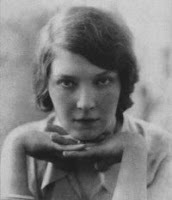
And then, just before I can get comfortable, I'm due in York on Tuesday 19th March to do the York Literature Festival 'Katherine Mansfield and Jean Rhys: Writers in Exile', which is at Jacobs Well at 2pm. Two of my favourite writers - and fascinating parallel lives. And only £4.00
Katherine Mansfield and Jean Rhys: Writers in Exile
Katherine Mansfield: The Story-teller - now available as an E-book
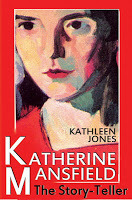
Published on March 14, 2013 14:43
March 11, 2013
Tuesday Poem: Billy Collins - Litany
Billy Collins steals someone else's poem and makes me smile!
For more wonderful Tuesday Poems please visit the Tuesday Poem main website and check out the side bar for more contributions. This week the main hub poem is from Oceania.
For more wonderful Tuesday Poems please visit the Tuesday Poem main website and check out the side bar for more contributions. This week the main hub poem is from Oceania.
Published on March 11, 2013 14:48



